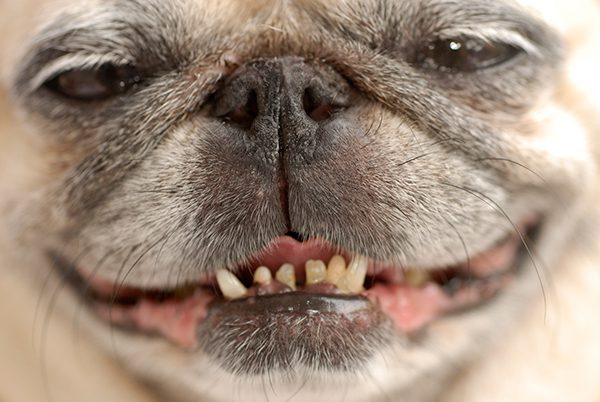Lakeland Pet Owners: How to Fix and Prevent Bad Breath in Dogs
There is possibly nothing worse than going to pet a dog and they lick you across the face while they have bad breath. Many dog owners can attest that some dogs’ breaths can be simply foul, and they have likely wondered how they can prevent and fix bad breath in dogs.
Possibly the best way to prevent bad breath in dogs is to keep their teeth clean and prevent them from eating things that are smelly. When it comes to fixing bad breath in dogs, it is always best to work on cleaning their teeth as well. You may also want to visit a vet about your dog’s bad breath if it does not seem to be improving.

In this article we will be explaining how dog owners can fix and prevent bad breath in dogs. In addition to this, we will also be explaining what causes bad breath in dogs and when you should see a vet about this issue. Let’s get right into it!
What Causes Bad Breath In Dogs
There are many different things that could cause a dog to have bad breath. Possibly the most common reasons why a dog’s breath smells is due to something they ate, a buildup of bacteria in the mouth, and dental disease. However, there are some other conditions that can cause bad breath in dogs as well such as stomach problems and diabetes.
Here are the most common causes of bad breath in dogs:
Bacteria
Dogs do not floss, use mouthwash, or brush their teeth in the same way that people do. Although owners can brush their dogs teeth with toothpaste that has been made specifically for dogs, we can sometimes forget to do this. As a result, some dogs will have bad breath simply because their teeth haven’t been cleaned recently.
Dental Disease
Dental disease occurs when a dog’s teeth hasn’t been cleaned for an extended amount of time. This causes a dog to have bad breath, and they may exhibit other symptoms such as pain in the mouth, sneezing, bleeding, and a reduced appetite. In addition to this, they may also have a noticeable amount of gum inflammation and tartar buildup.
They Ate Something Gross
Let’s face it, dogs will often eat things that are repulsive and smell awful to us humans. This can include garbage, rotten foods, dead animals, and even feces. Your dog may have some foul smelling breath after eating things like this.
Stomach Issues
Bad breath can also be caused by a bacterial imbalance within a dog’s gastrointestinal tract. In addition to bad smelling breath dogs with these kinds of issues may have smelly farts and loose stools.
Diabetes
Some dog owners may be surprised to discover that diabetes can cause bad breath in dogs. This strange breath odor has been reported to smell sweet or fruity, and it is a sign that you need to take your pet to the vet as soon as possible.
In addition to this strange smell on their breath diabetic dogs may experience:
- Increased urination and thirst
- Increased appetite
- Unexplained weight loss
- Cloudy eyes and vision loss
- A dull coat
- Skin problems
- Vomiting
- Lethargy
Other Conditions Causing Bad Breath In Dogs
Some other serious medical conditions can cause bad breath in dogs. These mainly include conditions affecting the liver, kidneys, and GI tract. In addition to this, foul breath can occasionally be a sign of liver or kidney failure.
As a result, you should take your dog to the vet immediately if they have foul breath paired with other strange and worrying symptoms.
How To Prevent Bad Breath In Dogs
The best way to prevent bad breath in dogs is to make an effort to clean their teeth regularly. This will prevent things like dental disease and a buildup of bacteria in the mouth. It can also be helpful to prevent your dog from eating foul smelling items and feed them a balanced and proper diet as well.
Of course, the best way to prevent foul breath that is caused by a medical condition like diabetes is to take your pet to their regular vet checkups and take them to the vet as soon as you notice anything wrong with your pet. This way they can catch these conditions early on and prevent the onset of complications.
How To Fix Bad Breath In Dogs
Treating bad breath in dogs depends entirely on what is causing it. For example, bad breath caused by a buildup of bacteria in the mouth will likely require a teeth cleaning to improve it. The same is true for when dogs eat smelly things that they shouldn’t necessarily be eating.
However, there are some causes of bad breath in dogs that will require treatment from a vet. Things like diabetes, dental disease, stomach issues, and other medical conditions will need to be treated before the bad breath gets better.
Considering that the treatment plan will differ from dog to dog in these instances, it is always best to start off your dog’s treatment by talking to a trusted, licensed veterinarian.
When To See A Vet About Your Dog’s Bad Breath
Although bad breath in dogs does not always need to be treated by a vet, there are some instances where bad breath in dogs definitely warrants a vet visit. Here are some situations where you should definitely take your dog to the vet as soon as you can.
- If your dog’s bad breath is paired with other strange or troubling symptoms (this could indicate diabetes or another medical condition)
- If your dog’s breath smells sweet or fruity (indicative of diabetes)
- If their bad breath is not improving with teeth cleanings
- If your dog is also experiencing bad gas and stomach issues (usually caused by a diet problem)
- If you notice bleeding or pus coming from the mouth
- If you notice missing or rotted teeth
- If your dog has inflamed , red gums
- If they ate something that could potentially make them sick (examples are rotten food, dead animals, a strange animal’s feces, etc)
We’re here for all your pet care needs at Lakeland Animal Clinic. If you have any questions regarding your pet’s health or want to schedule a visit, give us a call!
Recent Posts
About Us
Family is family, whether it has two legs or four. At Main Street Veterinary Center, we've spent the last 40 years healing and caring for your pets. As a family-operated practice, we know that family is about more than simply being related. Animals give us the ability to develop strong bonds and feel great compassion for a fellow living creature.
